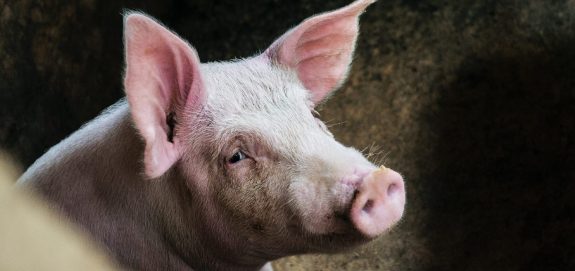On July 22, 2020, the Canadian Food Inspection Agency (“CFIA”) charged Hylife Foods with animal cruelty for an incident at its pig slaughterhouse in Neepawa, Manitoba nearly two years earlier. According to the CFIA, on September 18, 2018 slaughterhouse workers misused equipment and caused pigs to suffer avoidable distress or pain contrary to the Meat Inspection Act.
The company pleaded guilty to three cruelty charges and was fined $75,000. This fine may seem significant, but it is a drop in the bucket when one considers that the Thai- and Japanese-owned Hylife slaughters over 3.2 million pigs each year and 50.1% of its shares were purchased last year for $498 million.
The CFIA is refusing to publicly share more information about the convictions, so the public is currently in the dark about what happened at the Hylife slaughterhouse that day, or how many pigs suffered as a result. It is also unclear why it took nearly two years for the CFIA to lay charges. Surprisingly, there was almost no media coverage of the incident.
While it is tragic that these pigs endured even more pain and suffering during slaughter than is considered acceptable under Canadian law, it is at least good to see the CFIA take rare enforcement action. Canada’s legal standards for both transport and slaughter of farmed animals have been widely criticized as weak and underenforced.
No oversight of Canadian factory farms
Sadly, it is only when farmed animals are transported or slaughtered that there are legal standards governing their treatment in Canada. For the rest of their lives, farmed animals are not protected by legally binding standards of care. Provincial animal welfare laws generally exempt any pain and suffering caused by standard agricultural practices and there are no proactive government inspections of farms to monitor the welfare of animals. While the abuse of animals during slaughter can result in penalties due to the presence of CFIA inspectors at slaughterhouses, the vast majority of abuse on farms goes unreported.
Even during transport and slaughter, when there are legally binding standards of care for the treatment of farmed animals, the Hylife incident shows that fines for offenders are woefully inadequate to act as a deterrent against future abuse.
There is an urgent need for transparent oversight of Canadian slaughterhouses, including publicly-shared inspection reports that inform concerned citizens and consumers when slaughterhouses violate animal welfare, workplace safety, or public health laws. It’s high time industry and governments listed to Canadians, the vast majority of whom care about the treatment of farmed animals and want more transparency and oversight in our food system, not less.
Join the Animal Justice mailing list




